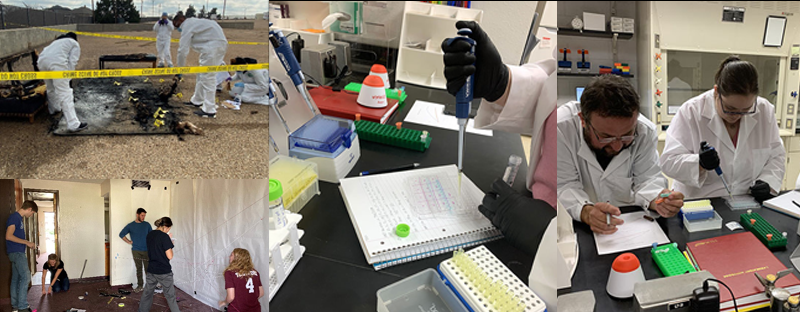Forensic Investigation

The Forensic Investigation Concentration is designed for students who have a social science background (i.e., anthropology, psychology, sociology, criminal justice, criminology) and intend to work in a non-laboratory setting. Note: This concentration requires the completion of a formal thesis OR a formal internship and comprehensive exam. Internships and the beginning of data collection typically occur during the summer between the first and second years of the program and may require the student to remain in Lubbock or travel to the internship or data collection location.
Currently, there is a lack of techniques for rapid on-site screening of body fluids, such as blood, fingerprints, and sweat. Each body fluid contains a specific set of clinical biomarkers that can be exploited for the determination of originator properties via point-of-care (POC) diagnostic approaches. These metabolites can be detected in various combinations to allow for a range of applications from the identification of an individual to the diagnosis of a disease. This concept has successfully been used for the determination of age from blood, of biological sex from fingerprints, and of individual differentiation from sweat. Biomedical diagnostic systems capable of detecting and monitoring metabolites related to an individual’s state-of-health facilitate a diagnosis and treatment by less-skilled medical professionals. Our research requires the identification of new metabolic markers for the development of rapid and non-invasive methods with forensic, clinical, and security applications.
Current Projects:
- Noninvasive sensing: detection and/or quantification of metabolites and other compounds found in sweat from the skin surface, can be applied to biometric, forensic, and biomedical purposes such as determination of biological sex, or age of fingerprints
- Forensic Serology: using biometric analysis of compounds found in blood for originator differentiation, similar to that of DNA comparison methods
- Fingerprint content analysis: utilizing the compounds contained in latent fingerprints to determine originator attributes for forensic investigative purposes
- Noninvasive detection of illicit drugs: sensing of illicit drug metabolites such as THC from individual sweat samples for forensic and biomedical purposes, as well as possible future law enforcement applications
- Novel approaches in chemical warfare agents (CWAs): ultra-sensitive detection and dosimetry of CWAs such as organophosphates (OPs) for military and homeland security applications
Faculty Contacts:
Department of Environmental Toxicology
-
Address
Department of Environmental Toxicology, Texas Tech University, Box 41163, Lubbock, TX 79409 -
Phone
806.742.4567
